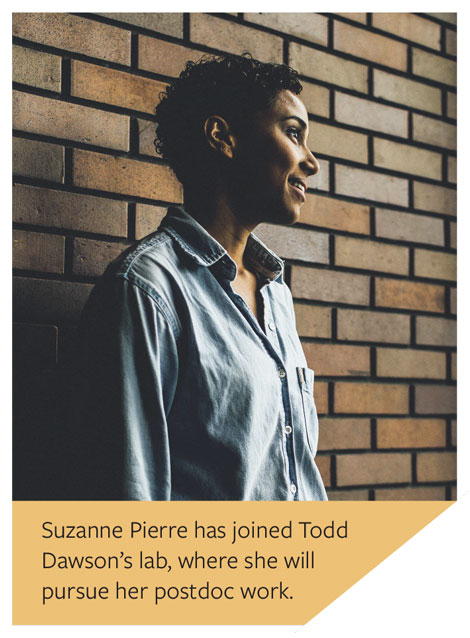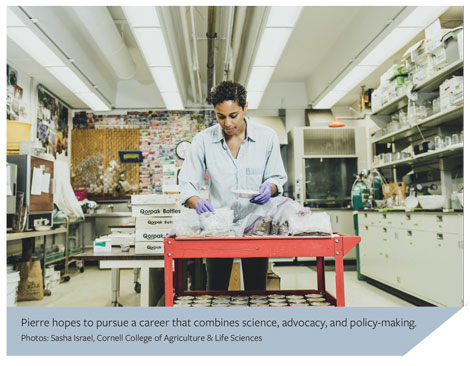

Until she was a junior in college, Suzanne Pierre was a journalism major — her heart set on becoming an international correspondent. But an environmental science class provided a tipping point: “I realized that not having a ton of lab experience or feeling like I’m not good at math ’t stop me from becoming a scientist,” she says. The two interests have since merged to put Pierre on a hybrid path, conducting research and writing about it for a broader audience. She hopes to pursue a career that combines science, advocacy, and policy-making around how people are adversely affected by climate change.
Pierre — a new UC President’s Postdoctoral Fellow — has joined Todd Dawson’s lab and will be completing her PhD at Cornell University’s Department of Ecology and Evolutionary Biology before beginning two years of postdoctoral work. Pierre first met Dawson at the University of Utah Stable Isotopes Course in 2014. His expertise in stable isotopes is central to her work in understanding how nutrients and water move around the earth and into the biosphere.
Using an interdisciplinary suite of tools from molecular biology, isotope mass spectrometry, and ecosystems ecology, her research has focused on how temperature affects microbial-community and ecosystem nitrogen and carbon dynamics across natural environmental gradients. “As an ecologist and biogeochemist, my goal is to understand how these controls may be altered by rising mean annual temperatures, intensifying droughts, and rapid urbanization,” she explains.
Pierre first became excited about soil biogeochemistry and ecosystem change in 2012 while working at the Cary Institute of Ecosystem Studies in Millbrook, New York. She graduated from New York University the following year with a BA in environmental studies, then pursued her PhD in ecology and biogeochemistry at Cornell University. While at Cornell, she was a Sloan Fellow and an NSF Trainee in the Cross Scale Biogeochemistry and Climate IGERT, as well as a teaching assistant and research mentor to undergraduates.
As she grew up in suburban Somerset, New Jersey, where there were still sheep farms on her street, Pierre’s interest in nature was “purely wonder-based.” She remembers playing in the soil and experiencing “the shock and awe of understanding the connectivity of everything.”
It was in a high school environmental science class where she saw an image of the nitrogen cycle. “All those arrows connecting every aspect of the environment just blew my mind and made me think, I really love nitrogen!” she says. “It’s the holy grail of the environment.” As a core nutrient for plants, the chemical element serves as home base for her research questions and the lens of her analysis. “Nitrogen is the core of my long game,” she says.
Outside of her actual research, Pierre is interested in science communication. She writes essays and feature articles about marginalized experiences in science and nature, and runs a personal blog and an Instagram account (@belowground_activity) about social and ecological concepts.
“As a scientific field mobilized for social change, ecology needs a cultural shift,” she says. “It isn’t just about basic science, but about putting a social context on findings and practices. I want to bring science to a socially conscious framework.”
Back to Main Spring 2018 Newsletter Page





